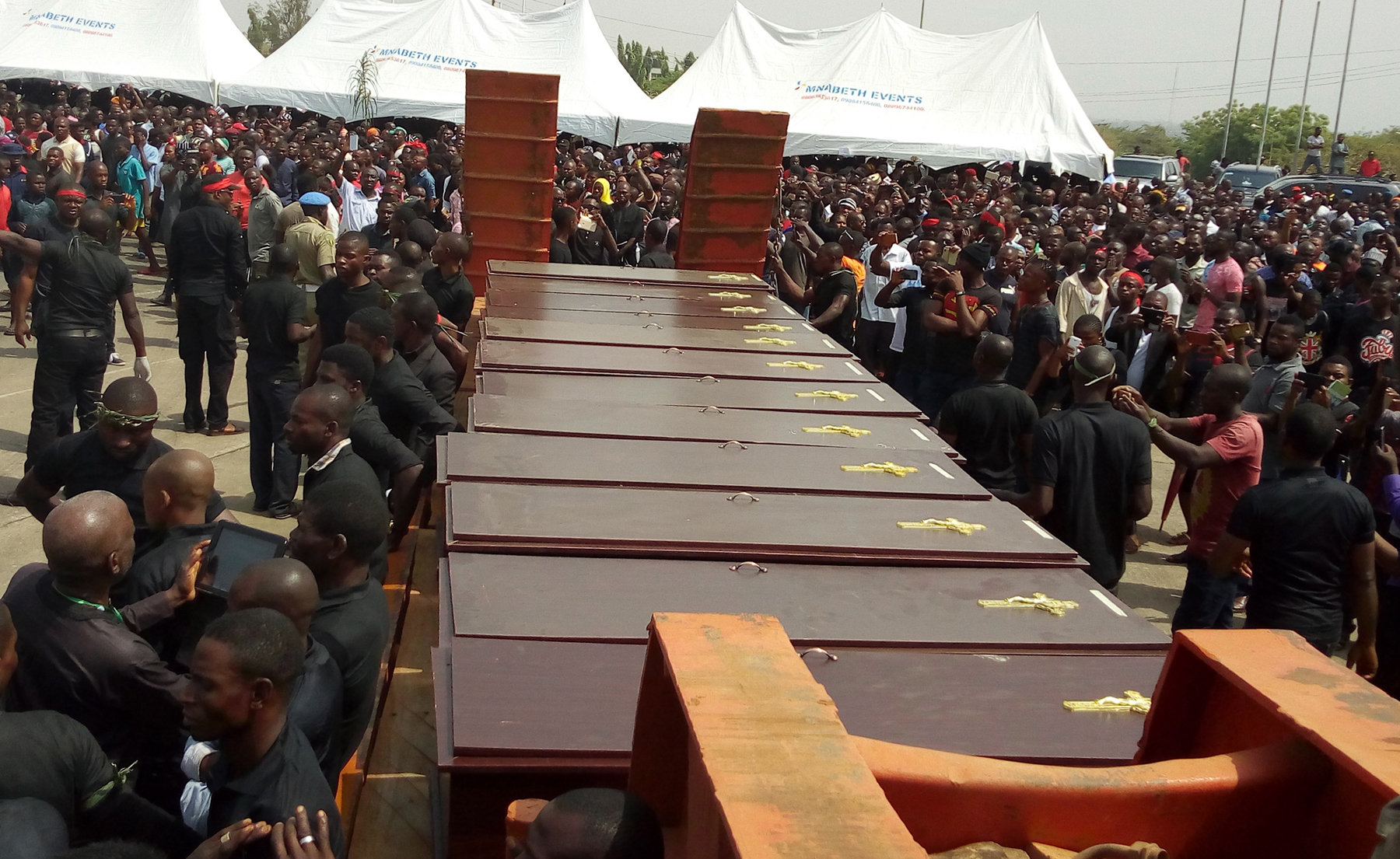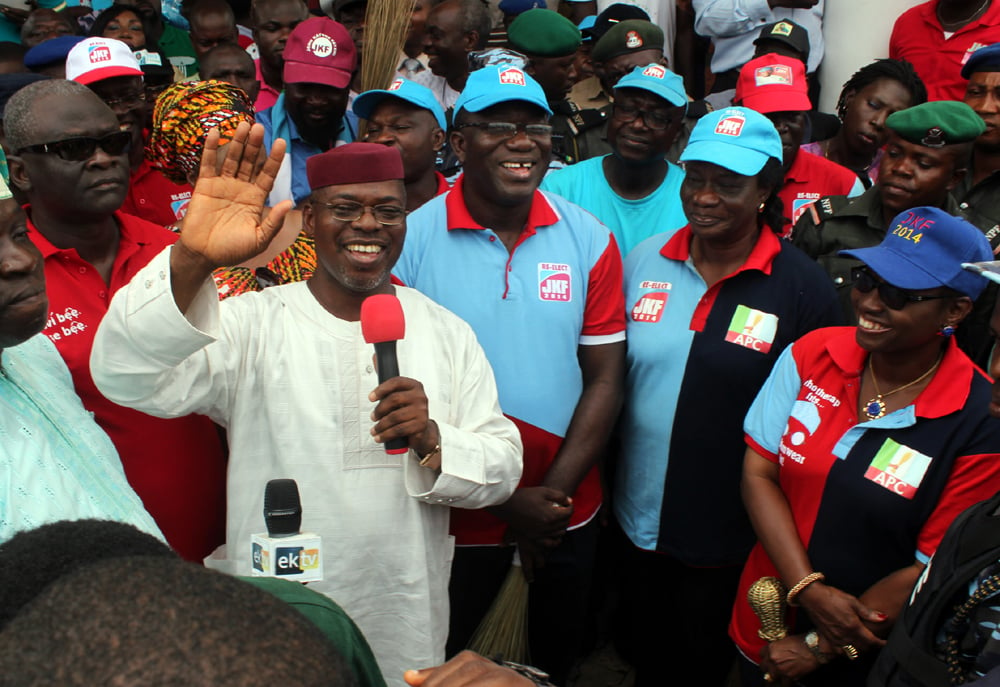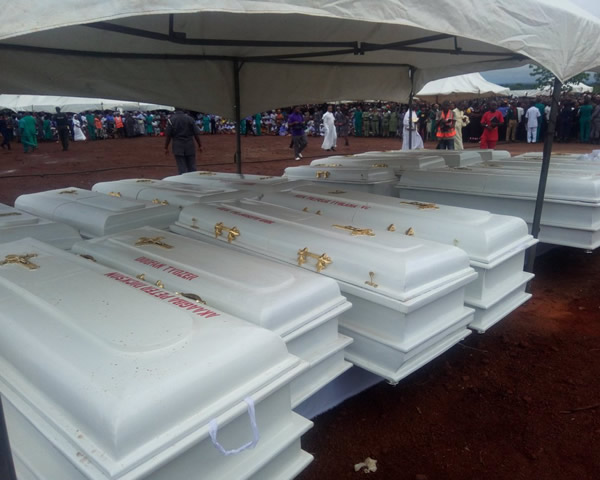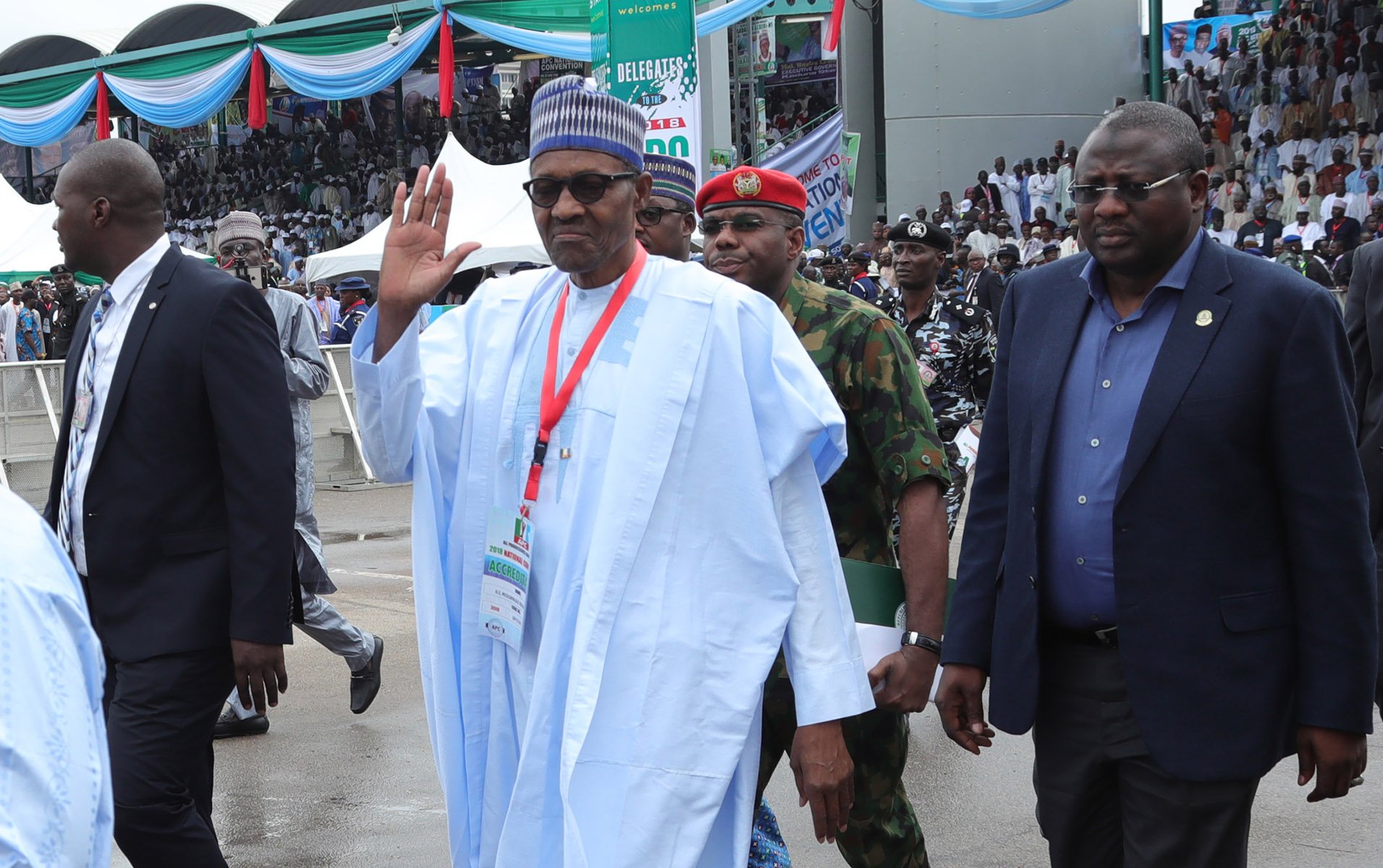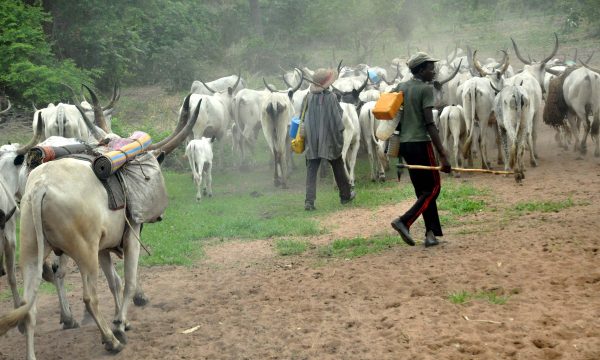Pic.13. Some of the corpses of the 73 killed persons killed during the Fulani Herdsmen attack on Benue communities in Guma and Logo Local Government Areas, during their funeral service at the IBB Square in Markurdi on Thursday (11/1/18).
00204/11/1/2018/Emmanuel Antswen/BJO/NAN
Sometime in the 1970s, the Juju music maestro, then known as Chief Commander Ebenezer Obey, did a track wherein a line lamented the cheapness of death in the country.
The line “iku di mejiepinni,” meaning “death has become two for a penny,” spoke about the frequency with which people, especially young ones died. It talked about the low life expectancy in the country and waxed spiritual by wondering whether this was a result of sin. Were he still in his elements today, one can only imagine what the great music composer and musical artiste would be singing.
At the time Obey released this music, those who died, even if they were young, died mostly from natural causes, largely due to the evolving state of medical sciences, not just in Nigeria but across the world.
The state of medicine has since improved so tremendously that illnesses, which killed people in the 1970s, have either been totally eradicated or most countries of the world have upgraded healthcare delivery so that preventive and curative therapies prolong the lives of people or entirely save them from such ailments.
Advertisement
But not Nigeria. The world seems to have moved on and left our dear nation behind.
Although Nigeria is significant for her population and large mass, it is notorious for supplying the world with the worst developmental index possible.
A 2015 report of the National Population Commission suggests that a total of 52,000 people die annually from childbirth or pregnancy related complications. In other worlds, one woman dies every ten minutes in the process of bringing a new life. And the World Health Organisation says at least 70 percent of these deaths can be prevented if women had more access to skilled medical care. Medical science has found solutions to complications like post-partum hemorrhaging (excessive bleeding); hypertensive disorders (eclampsia), prolonged labour and infections that account for the preponderance of incidences of mortalities resulting from pregnancy. But not Nigeria!
Advertisement
In addition to the number corpses of women of child bearing age that Nigeria piles up every year, 2,300 under-five year children die from a myriad causes that the country is still grappling with.
WHO says that an average of 240 Nigerians die from cancer every day in NigeriaThis translates to ten people every hour and a total of 80,000 in a year. Nigeria is said to introduce an extra 100,000 cases of cancer into the world burden annually yet the country has less than one radiotherapy machine per one million people, hence, the Nigerian cancer death ratio of four out of five cases. At least 300, 000 fall into the cold arms of the grim reaper through malaria every year not to talk of the number of lives lost to non-communicable diseases and several other infections that most of the world no longer contends with.
Sadly it is clear that no one, leader or led, pays definitive attention to the tragedy of healthcare delivery and what the unquantifiable volume of lives lost does to the image and future of Nigeria. Government at all levels, of course pays lip service, voting billions of naira to the sector annually, but there is no manifest improvement in access and quality of healthcare delivery from the primary, secondary, tertiary levels in Nigeria, which is a shame.
But the failure of governance and the humanity of Nigeria is even more evident in the unbridled level of cold blood letting that happens in the name of ethnic/religious clashes and other violent crimes. The country just seem to have suddenly been taken over by some merchants of death. It is so bad that Governor Abdul’azizYari of Zamfara State recently raised the alarm about his inability to maintain law and order in his state. This was after 30 lives were lost within one week
Advertisement
A report published in THISDAY newspaper in May, 2018 suggested that 900 people were killed in such violent circumstances in the first five months of this year. The number included lives lost in Benue, Taraba, Kaduna, Kwara, Plateau, Nasarawa, Niger, Kogi and Adamawa States.
Last weekend, another 200 lives or more were added to the list when three local governments in Plateau State came under the attack of herdsmen who were said to be avenging the killing of their kinsmen as well as the theft of their cattle.
What happened on Sunday was not new though. Time and time again herdsmen have wrecked this inhuman havoc on helpless communities. You have justification of the attacks on the strength of its being reprisals to violence that had been brought on the Fulani herdsmen in the past. How these first attacks remain largely unreported is however a mystery.
Assuming the justification is correct however, that no one who has been involved in venting those reprisal attacks, which are usually not of equal measure with the supposed initial ones could suggest that self-help is a legal resort in Nigeria.
Advertisement
It is more curious because, as we have seen in the case of the latest incident in Jos, not onlytheMiyetti Allah Cattle Breeders Association of Nigeria, the umbrella body of the Fulani herdsmen speaks to justify this events, even the presidency has helped to ventilate it!
For instance the statement released by the presidency on Sunday quoted security information which indicated that about one hundred cattle were rustled by a community in Plateau State, and some herdsmen were killed in the process.
Advertisement
It also shows the incompetence if not complicity of law enforcements agencies in the country. If security forces had the information quoted in the statement issued by Senior Special Assistant to the President on Media and Publicity, Malam GarbaShehu, knew that cattle had already been rustled, it behooves on them to have given justice to the owners of the cattle by arresting those who perpetrated the crime and taking it further by deploying resources to forestall reprisals. That none of these happened should mortify the security forces to the level that they would be unable to tender excuses of the initial crime. The presentation of this excuse by the President’s spokesperson only goes on to portray the nation’s security apparatus as largely reactive and inefficient.
But, more importantly, it reflects the total disrespect for life amongst us as a people. Over the past couple of months government officials including the Minister of Defence has exposed the lack of will to deal with this situation with suggestions that states which have enacted laws to protect their people against the incursion of Fulani herdsmen may have to repeal those laws before there can be peace in the country.
Advertisement
What the powers that be fail to realise is that such postures unwittingly embolden the citizens capacity to seek self-revenge and invariably wittingly down the essence the country’s law ultimately turning the country into barbaric state in which power is might and reasoning is lost.
There is no sane society where a man is allowed to take the life of another without consequence and even if that happens, the state takes the commission of such offences as one done against it and not necessarily against the receiver of the aggression. Without this, the world would live in disorder and lives, even of those who are innocent of any crime would be in jeopardy. The gradual degeneration of Nigeria into a killing field is the failure of government to hold the lives of citizens with the sanctity that it deserves. And when government shows no respect for lives, the people follow suit. This is why there is so much bloodletting around us, if it is not Boko Haram, it would be Fulani herdsmen or ethnic militias or armed robbers, or accidents from the death traps that we call roads or kidnapers or frustrated policemen who turn their guns on innocent citizens. Death just seems to lurk in corners across the country.
Advertisement
But Nigeria’s only redemption from the current path of self-destruction is for its people to place more of value on the lives of the people who make the country. No country, where death is so commonplace can truly aspire for greatness. No matter how much resources it has or how much infrastructure it builds, human life is the essence of society and a single human life should be worth more than all the treasures that man can acquire. Nigeria needs to re-learn that
Views expressed by contributors are strictly personal and not of TheCable.

